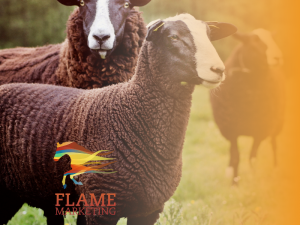

Wool sales used to be able to pay the rent for a farm, but today that would be seen as impossible. With wool prices struggling to hit even 20p a Kg during 2020 it’s hardly worth selling. But as shearing is a welfare matter, it  must be done! This means we have a pretty much worthless product without a market. Well, we thought we did. But one inventive farmer has found a farm diversification project which turns worthless wool into a thriving business. Read on to see how you could turn your worthless wool into money.
must be done! This means we have a pretty much worthless product without a market. Well, we thought we did. But one inventive farmer has found a farm diversification project which turns worthless wool into a thriving business. Read on to see how you could turn your worthless wool into money.
Bracken is a scourge for many hill farmers, eating up valuable grazing land, providing an ideal habit for ticks, and proving difficult to control. But a farmer in Cumbria has turned this worthless weed into a valuable and highly sought-after product.
Simon Bland, who farms at Dalefoot in the valley of Heltondale in the Lake District, has been producing peat-free compost for the past 22 years using various natural products. The two main ingredients he uses are bracken and wool. On his own farm, which rises from 800ft above sea level to 2,000ft, he is harvesting about 20ha (50 acres) of bracken each year.

Composting business is the Bland’s way of trying to farm without subsidies. However, with compost orders doubling year-on-year, Mr Bland is seeking other farmers to harvest bracken to make up the total 7,000 big bales he requires to produce 700,000 bags of compost. Farmers Weekly spoke to him to find out more about harvesting, returns and how he makes it into compost.
Benefits of harvesting bracken
Mr Bland is paying farmers an average of £22 a bale delivered to his farm, with prices varying if haulage is required.
“We can organise haulage but that will be an additional cost. We also have contracting teams that can harvest the bracken and had a contractor in Bristol supplying us with bracken last year,” he adds.
Mr Bland is trying to connect with farmers and develop strong and sustainable relationships by offering to take their wool too. This is also made into compost and he pays a premium of 40p/kg for hill breed wool. He can only take undipped wool as the compost is certified organic and OP dip locks up in the wool’s lanolin. Farmers must sign a declaration the wool has not been dipped.
With many hill farmers needing to increase their incomes, particularly due to the uncertainty facing the new payment system, this could be an ideal farm diversification project which would bring in a new income from existing by-products.
 Bracken can be harvested every year from about the second week in July onwards. The crop should be in full leaf – not when the leaf is still in curl – and should be cut down to about 30cm in height. Cutting too early not only affects the yield but it cuts the vigour of the plant back quite a lot. Once cut, the crop should be left for about 10 days to dry before being baled. The crop should be as dry as straw and hay at the point of baling. On average, farmers can expect to yield between 10-17 bales/ha (4-7 bales/acre).
Bracken can be harvested every year from about the second week in July onwards. The crop should be in full leaf – not when the leaf is still in curl – and should be cut down to about 30cm in height. Cutting too early not only affects the yield but it cuts the vigour of the plant back quite a lot. Once cut, the crop should be left for about 10 days to dry before being baled. The crop should be as dry as straw and hay at the point of baling. On average, farmers can expect to yield between 10-17 bales/ha (4-7 bales/acre).
A normal three-point linkage mower with a standard 2.7m cut can be used along with a standard round-baler. Depending on the ground conditions, dual wheels may be needed on extreme terrain or where the ground is wet. However, for farmers in stewardship schemes, it is important not to damage the land. Mr Bland has been harvesting bracken on the fields surrounding his farm for the past two decades. The use of satellite technology in recent years has made it a lot easier as they have logged where all the big rocks are.
How bracken is made into compost
The bales are put through a chopper and added with other ingredients, depending on the type of compost they are making. Dalefoot Compost produces eight different compost varieties. Each mix varies in ingredients but can include components such as wool, bracken and grass. Mr Bland is harvesting about three cuts of grass silage a year from 24-28ha (60-70 acres) of in-bye land for composting.
The compost mix is then piled in a heap and turned every day. Quite quickly the temperature in the heap will increase to about 70C. At this temperature, it sterilises any seeds or pathogens.
Turning it every day is necessary to provide an even heat profile throughout the heap by allowing some of the heat to be released. If the temperature is even, the bacterial activity is stable throughout. It is important to keep the bacteria aerobic and not anaerobic, as the latter will affect fermentation and make the product unusable as compost.
The turning process must continue for eight weeks. After this, the compost will be ready for bagging. Prior to being bagged, the compost is put through a screen filter to remove any large particles.
Mr Bland is supplying garden centres as well as mail order. More gardeners are becoming aware of the unsustainable nature of peat composts and are looking for alternatives, he says. During the pandemic, Mr Bland and his team saw mail orders increase by 15,000% due to many people taking up gardening. He says: “We can easily sell what we produce which is why we are looking at working with more farmers and forging sustainable long-term relationships. The pandemic highlighted the weakness in the supply chain for peat-free alternative composts, such as Coir which is imported from places such as Sri Lanka. It has emphasised the importance of sustainability.”
If you are interested in supplying bracken, get in touch with Dalefoot Compost on 01931 713281 or visit dalefootcomposts.co.uk
Article available from Farmers Weekly
This is clearly a farm diversification project which has solid roots. At Flame Marketing we love inventive and unusual farm diversification projects, if you have a project that is a bit of the wall why not book a free consultation with us to find out how we can help take your farm business to the next level.